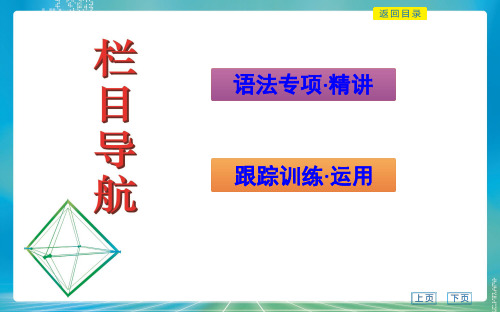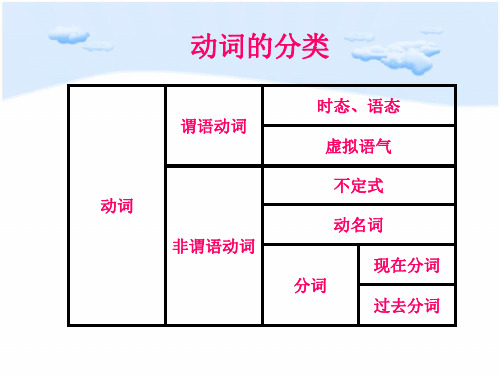语法考点讲练第六专题动词时态和语态课件课件
合集下载
《动词时态和语态》课件

语态的用法
被动语态的构成: be+过去分词
被动语态的用法: 表示主语是动作的 承受者
被动语态的时态: 根据主语的人称和 数以及时间状语来 选择
被动语态与系表结 构的区别:被动语 态强调动作,系表 结构强调状态
动词时态和语态的搭配使用
一般现在时与被动语态的搭配使用 现在进行时与主动语态的搭配使用 过去完成时与被动语态的搭配使用 过去进行时与主动语态的搭配使用
写作练习
动词时态和语态的 基本概念和用法
不同时态和语态的 辨析与选择
写作中常见的时态 和语态错误及纠正 方法
练习题及答案解析
总结与回顾
总结重点内容
动词时态的种类和用法 语态的分类和用法 时态与语态的辨析和区别 常见错误和注意事项
回顾学习过程
动词时态的分类与 定义
动词时态的用法与 辨析
语态的分类与定义
练习与巩固
选择题练习
● 题目:下列句子中,动词时态使用正确的是( ) A. He _______ (buy) a new car last year. B. They _______ (play) football in the park yesterday. C. We _______ (study) English since 2010. D. They _______ (not finish) their homework yet. ● A. He _______ (buy) a new car last year. ● B. They _______ (play) football in the park yesterday. ● C. We _______ (study) English since 2010. ● D. They _______ (not finish) their homework yet.
英语语法讲座第6讲动词的时态和语态精品PPT课件

动词的时态和语态
②在状语从句中,如if,unless,as long as,once,as soon as,when,before, till引导的状语从句中,此时主句谓语只能 用shall,will表示将来。
If he goes there tomorrow,I’ll go there,too.
表示从过去的 某时间看将要 发生的动作或 存在的状态
She said her father
would buy her a watch. 她说她父亲会给她买块 手表。
动词的时态和语态
时态
现在 完成时
用法
例句
表示动作在说话
之前已完成,但 对现在有影响
He has been to Japan. 他到过日本。
例句
How many new words had you learned by the end of last term? 到上学期末你学会了多 少新单词?
I have been working here for three years.我 一直在这里工作3年 了。
动词的时态和语态
2.将来时的六种表示方法 (1)用shall/will do表示单纯的将来。 在下列情况下只能用shall,will表示将 来: ①在含时间或条件等状语从句的主句中 只能用shall或will表示。 I’ll telephone you as soon as I get there. 我一到达那里就给你电话。
第六讲 动词的时态和语态
动词的时态和语态
一、动词的时态 1.考纲中规定有十种时态,现将其主 要用法归纳如下:
时态
一般 现在时
用法
表示经常 性、习惯性 的动作 表示现在的 状态、特征
《动词的时态和语态》课件

掌握英语动词的时态和语态的 基本概念和用法
理解不同时态和语态之间的区 别和联系
能够在实际语境中正确运用时 态和语态
提高英语语言理解和表达能力
02
动词的时态
现在时态
01
02
03
定义
表示现在时刻正在进行的 动作或存在的状态。
形式
基本形式为动词原形,如 “run”、“live”。
用法
描述当前正在发生的事情 ,如“I am writing a letter now.”
综合练习
• 时态与语态结合:结合不同的时态和语态进行练习,以增强对 语言使用的理解和掌握。例如:The book (which was) written by the author (will be) published next year.
THANKS
感谢您的观看
过去时态
定义
表示过去某个时间点发生 的动作或存在的状态。
形式
基本形式为动词的过去式 ,如“ran”、“lived” 。
用法
描述过去已经发生的事情 ,如“She walked to the park yesterday.”
将来时态
定义
表示将来某个时间点将要发生的动作 或存在的状态。
形式
用法
描述将来计划要做的事情,如“They will visit their grandparents next week.”
、将来时等。
04
练习与复习
时态练习
01
02
03
04
一般现在时态
描述日常习惯、能力和事实。 例如:I eat an apple every
day.
现在进行时态
描述正在发生的动作。例如: She is singing a song.
动词的时态和语态-PPT课件

8. The man _h_a_d__h_o_p_e_d__ (hope) to catch the last train, but he was too late.
9. The boys __w_e_r_e_p_l_a_y_in_g___ (play) basketball from 5:00 to 6:00 yesterday.Βιβλιοθήκη .19练习
.
20
用所给动词的正确形式填空: 1. She _l_e_ft__ (leave) the office two
hours ago. 2. As son as she arrived home, the girl
discovered that she _h_a_d__t_a_k_e_n__ (take) her friends book by mistake. 3. Who _c_o_m__e_s__ (come) to school earliest in your class every morning? 4. Great changes _h_a_v_e_t_a_k_e_n_p__la_c_e__ (take place) in this city since 1979. 5. By the time he was twelve, Edison _h_a_d__b_e_g_u_n_ (begin.) to sell newspape21rs.
I’ll go to see you when I have time. I’ll go to see you if I have time tomorrow. 2. 某些动词,如:stand, continue, wish, love, like, hate, feel, find, think等常用一般现在时态
9. The boys __w_e_r_e_p_l_a_y_in_g___ (play) basketball from 5:00 to 6:00 yesterday.Βιβλιοθήκη .19练习
.
20
用所给动词的正确形式填空: 1. She _l_e_ft__ (leave) the office two
hours ago. 2. As son as she arrived home, the girl
discovered that she _h_a_d__t_a_k_e_n__ (take) her friends book by mistake. 3. Who _c_o_m__e_s__ (come) to school earliest in your class every morning? 4. Great changes _h_a_v_e_t_a_k_e_n_p__la_c_e__ (take place) in this city since 1979. 5. By the time he was twelve, Edison _h_a_d__b_e_g_u_n_ (begin.) to sell newspape21rs.
I’ll go to see you when I have time. I’ll go to see you if I have time tomorrow. 2. 某些动词,如:stand, continue, wish, love, like, hate, feel, find, think等常用一般现在时态
动词的时态和语态ppt课件

4.在时间、条件、让步等状语从句中用一般过去时代替过去将来时。 He said that he would not go if it rained. 他说如果下雨他就不走了。
寒假来临,不少的高中毕业生和大学 在校生 都选择 去打工 。准备 过一个 充实而 有意义 的寒假 。但是 ,目前 社会上 寒假招 工的陷 阱很多
寒假来临,不少的高中毕业生和大学 在校生 都选择 去打工 。准备 过一个 充实而 有意义 的寒假 。但是 ,目前 社会上 寒假招 工的陷 阱很多
︱高中总复习︱一轮·英语
考点五 过去进行时 1.表示过去某一时刻正在进行的动作或某动作在过去某一阶段内发生或频繁
发生。 —Did you catch what I said? ——你听见我说的话了吗? —Sorry.I was answering a text message just now. ——对不起,我刚才在回短信。 —Have you finished reading Jane Eyre? ——你读完《简·爱》了吗? —No,I was doing my homework all day yesterday. ——没有,我昨天一整天都在做作业。
4.表示按计划、时刻表规定要发生的动作,但限于少数动词。如 begin,come, leave,go,arrive,start,stop,return,open,close 等。 The flight takes off at 2:30 every Wednesday and Friday.每周三和 周五航班两点三十分起飞。
︱高中总复习︱一轮·英语
考点三 一般将来时 1.will/shall (1)表示将来发生的动作或存在的状态。
He will travel around Europe this summer. 今年夏天他将环游欧洲。 (2)表示临时性的决定。 —Tom is ill and now in hospital. ——汤姆生病住院了。 —Really? I’ll see him. ——真的?我要去看看他。
寒假来临,不少的高中毕业生和大学 在校生 都选择 去打工 。准备 过一个 充实而 有意义 的寒假 。但是 ,目前 社会上 寒假招 工的陷 阱很多
寒假来临,不少的高中毕业生和大学 在校生 都选择 去打工 。准备 过一个 充实而 有意义 的寒假 。但是 ,目前 社会上 寒假招 工的陷 阱很多
︱高中总复习︱一轮·英语
考点五 过去进行时 1.表示过去某一时刻正在进行的动作或某动作在过去某一阶段内发生或频繁
发生。 —Did you catch what I said? ——你听见我说的话了吗? —Sorry.I was answering a text message just now. ——对不起,我刚才在回短信。 —Have you finished reading Jane Eyre? ——你读完《简·爱》了吗? —No,I was doing my homework all day yesterday. ——没有,我昨天一整天都在做作业。
4.表示按计划、时刻表规定要发生的动作,但限于少数动词。如 begin,come, leave,go,arrive,start,stop,return,open,close 等。 The flight takes off at 2:30 every Wednesday and Friday.每周三和 周五航班两点三十分起飞。
︱高中总复习︱一轮·英语
考点三 一般将来时 1.will/shall (1)表示将来发生的动作或存在的状态。
He will travel around Europe this summer. 今年夏天他将环游欧洲。 (2)表示临时性的决定。 —Tom is ill and now in hospital. ——汤姆生病住院了。 —Really? I’ll see him. ——真的?我要去看看他。
动词时态语态复习课件-(初中)

3. 一般将来时
1 .一般将来时表示计划、打算、企图做某事或来注 定要发生的事情。
2 .表示将来时的四种形式
①will /shall +动词原形 ②be going to do ③be about to do(正要干什么) ④be 强的计划性,打算干什么,而will 表示谈话时临时决定的意图,具有临时性和偶然 性。 ----The telephone is ringing.
2.Every year, many trees are planted(plant) along
the river. 3.Keep quiet, please! They are having(have) a
lesson. 4.---Hi,Lin Tao. I didn’t see you at the party.
一般过去 yesterday, last week, an hour ago, the other day, in 1982, just now
过去进行
过去完成 一般将来
this morning, the whole morning, all day, yesterday, from nine to ten last evening… when, while
----I _____ answer it. A. will B. am going to C. am to D. am about to
---Alice, why didn’t you come yesterday? ---I _____, but I had an unexpected visitor. A. had B. would C. was going to D. did ②be going to 可用来表达某种迹象要发生的事。而 will 不能表示 Look at the clouds! It’s going to rain.
英语语法动词的时态、语态PPT课件

过去进行时
1.过去进行时主要表示在过去某一时刻或某一段时间内正 在进行或持续进行的动作。 He was reading while she was setting the table. 2.与always, continually, frequently等词连用,表示过去经 常发生的动作,具有浓厚的感情色彩。 The old man was always telling that old story. 3.表示过去打算实现,但未实现的动作 I was coming, but I missed the last bus.
过去完成时
过去完成时表示过去动作发生之前已经完成的动作。只有在 与过去时间相比较时,才能使用过去完成时。 1、过去完成时+before/when/by the time+一般过去时 When we got there, the plane had already left. The plane had already left before we got there. 2.一般过去时+after/until+过去完成时 They went simming after they had finished their homework. 3.hope, plan, mean, expect, suppose, think 等动词有时用 过去完成时表示本打算做而实际没有实现的事。 I had hoped to help you, but I couldn't get there in time.
现在完成时
现在完成时由“have+过去分词”构成。 1. 现在完成时所表示的动作在说话之前已经完成,而对现 在有影响,句中没有具体的时间状语。 He has gone to Fuzhou. He has been to Fuzhou. 2.现在完成时所表示的动作开始于过去,持续到现在,也 许还会继续持续下去。常用for+一段时间,since+时间点, in the past+时间段。 He has studied English for 5 years. He has studied English since 1990. He has studied English in the past 5 ye在的特征、状态、经常性动作或真理,客观事实等 。 He goes to school every day. His home is in shanghai, but he stays in beijing at the moment.
【第六讲】动词(二):动词的时态和语态ppt课件

(3)用于虚拟语气句中,表示与现在事实相反的情 况。 If I were you, I would take a small present. 如果我是你的话,我就会带上一件小礼物。 If I won a million dollars, I'd give it to charities. 要是我赢了一百万美元, 我要把它捐给慈善机构。 注意 在虚拟条件句 “If I were you...”中, were 不能改为 was。
(3)以“辅音字母+ y”结尾的,变 y 为 i 加 es。 study→ studies, carry→ carries fly→ flies, cry→ cries,
Diana, together with her friends, __________ Chinese in China. A. study C. studies 答案: C B. have studied D. are studying
注意
若表示经过一定的计划安排之后打算做
某事,要用 be going to,而不能用 will。 My brother is going to learn English next year. 我哥哥准备明年学习英语。
(2)be going to 表示根据主观判断将来肯定要发生 的事情, will 表示客观上将来势必发生的事情。主语 可以是人也可以是物。 Look at the dark clouds! It's going to rain. 看那乌云!看来马上要下雨了。 My head hurts badly. I'm afraid I'm going to have a bad cold. 我头疼得厉害,恐怕要得重感冒了。 He will be twenty years old next year. 明年他就要 20 岁了。
